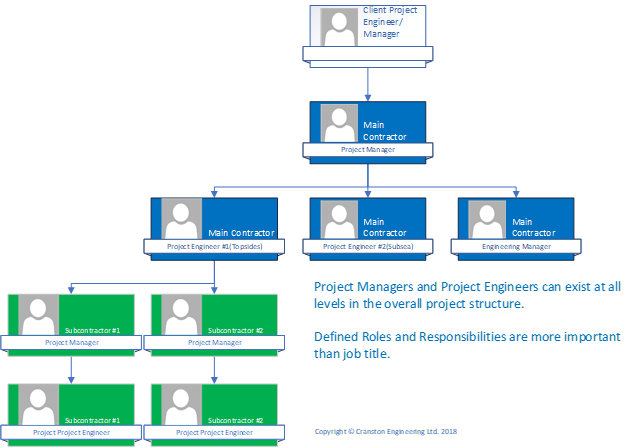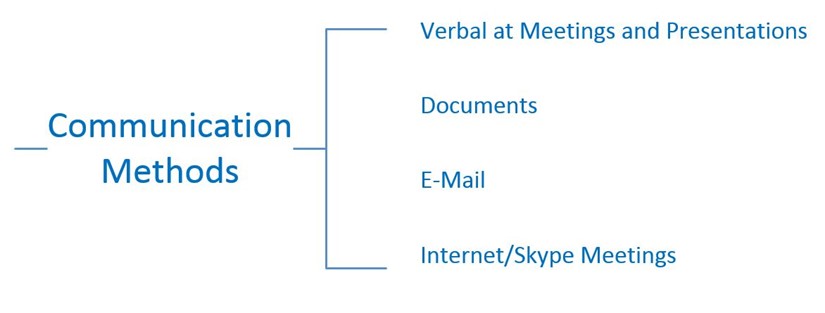What is a Project Engineer and what are their roles and responsibilities?
It is estimated that there are circa between 100,000 and 200,000 Project Engineers (PEs) in the worldwide Oil and Gas industry, so you are or will be part of a very large community. The term Project Engineer (PE) covers a multitude of areas and varying degrees of technical knowledge, project size and responsibilities, all having the common feature of accountability for the delivery of projects or part of a project

Project Engineers work for Oil & Gas operators, engineering contractors, equipment manufacturing subcontractors and maintenance companies. They have an essential role to play within technical project teams in ensuring that engineering/construction/maintenance projects are completed safely, within budget and in a timely manner.
A Project Engineer may be responsible for managing a project from thousands up to many millions of dollars. They may be part of a project management team responsible for parts of a larger project, or they may be responsible for managing a portfolio of smaller project scopes. The role of the Project Engineer can often be described as that of a liaison between the Project/Contract Manager and those within the technical disciplines relevant to the project. The Project Engineer is also often the primary point of contact for the client.
As a PE, it is standard for you to be responsible for successful delivery, and for managing scope, cost, schedule and risk. The greatest accolade a Project Engineer can receive is a simple two words: “You deliver!”
A Project Engineer Understands Why the Scope is Needed
Many projects run into problems because the scope is either poorly defined, poorly understood, or both. The Project Engineer needs to fully understand the scope and why it is needed so he/she can provide the optimum solution using the resources at his/her disposal. A structured technique for defining, agreeing and maintaining scope alignment is explained in the “The Position Statement.” See Project Engineer’s Toolkit course.
Generates the Big Picture
The Project Engineers needs to set the direction the team will proceed in and supports team members in reaching the goals. Sometimes the individual engineering disciplines/subcontractors are so focused on their individual scopes, that they may not appreciate the bigger picture. By taking time and discussing with both internal and external stakeholders, the Project Engineer can build the “big picture”, manage the interfaces, and communicate to the wider team.
Being able to simplify and communicate complex issues and scopes is a vital Project Engineering skill because it allows team members to understand the overall scope, and thus be better able to understand where their contribution fits.
Responsibility for Scope, Schedule, and Costs
In most projects, the Project Engineer is responsible for scope cost and schedule, although this can vary on the specific project.
- Scope is what we are going to do.
- Cost is normally the budget of the project.
- Scheduleis when we are going to do it.
Managing Change
Change is in the nature of projects, be it scope, schedule, cost or other influences. Badly managed change can result in cost and schedule overruns and an unhappy client. However properly managed change ensures that there are no surprises and that changes are agreed before implementation.
On many projects, the Project Engineer is responsible for managing change requests/variations and for submitting them to clients for approval. Some lucky Project Engineers may have a Change Coordinator to assist them with the workload associated with the changes. The job of Change Coordinator is an excellent position for new recruits/graduates as it exposes them to all areas of the project and reinforces the importance of change control from day one.
Poor management of change is a common reason for a “bad” project. Change is integral to all projects and properly identifying and managing change is an important skill for the Project Engineer.
A Project Engineer Coordinates Resources
Coordinates Engineering Resources
The Project Engineer will be responsible for coordinating engineers from various disciplines including Process, Structural, Piping, Instruments, and Electrical, to name but a few. I have specifically used the word “coordinate” because in many projects, the Discipline Engineers report to their discipline leads for work allocation and technical guidance, although their efforts are coordinated by the Project Engineer.
The simplest way to view coordination is that the Project Engineer represents the client’s interests while simultaneously being a customer for the Discipline Engineers.
Coordinates Vendors and Subcontractors
Almost all projects will require the services of subcontractors and vendors.
Subcontractors
Subcontractors are suppliers that enter into specific work contracts with the main contractor to work on major projects or for companies that need specific tasks to be completed within a limited period. Companies usually enter into subcontracting arrangements because they do not have the expertise in-house.
Vendors
Vendors are suppliers that sell identical or similar products or services to different customers as part of their regular operations. Examples include procurement of catalogue parts and components.
Project Engineers are often responsible for coordinating and integrating subcontractor and vendor services into the overall project delivery. Many PEs are employed by subcontractors and vendors responsible for their company’s contribution to the greater overall project.
Typical organisations
Project Managers and Project Engineers can exist at all levels in a project as illustrated below. Defined roles and responsibilities are more important than job titles.

One of the most important traits of a good Project Engineer is excellent leadership skills. However, do not worry if you do not currently rate yourself as a strong leader since leadership skills can be learned and practised. Most people already have some leadership skills, and in this book we will look at techniques to develop those skills.
Resolution of issues.
In projects, many issues are not black and white and will call for some project support to resolve. The Project Engineer will be able to facilitate resolution of multi-discipline and multi-company issues. Guidance, support, and coaching in resolution will normally be provided by the Project Manager or other more senior Project Engineers.
The key to resolution is to fully define the issues, communicate to all the required people, and work systematically to an agreed upon and documented solution.
Defusing issues
As your experience develops you will be able to anticipate problems and defuse them before they impact the project. To outsiders, some of the most successful Project Engineers seem to be calmly sailing along without any issues, but underneath the surface they are working hard to identify and prevent problems from building up. This should be your aspiration.
Making decisions
Often you have to facilitate a decision to progress a project scope, and you may have to do this based only on partial information. Depending on your project, you may work through an issue with the team, document it, and having the bigger picture, `make a recommendation to be ratified by your manager. All project decisions should be recorded in the project decision register including at a minimum, the decision, date of decision, decision parties, and any key document attachments. Making difficult decisions will develop good judgment; you might not always get it right, but when you don’t, you will certainly learn for the next time.
Client interface
The Project Engineer is normally the direct single point of contact with the client’s representative for the project or part of a project. This will require regular verbal and written communication. Your people management skills will be developed and tested as you work with clients ranging from pleasant, challenging but fair to downright rude. The key is to remain polite and professional at all times since you are the face of your organisation.
Approving Expenditure
As a Project Engineer you will normally be responsible for elements of the budget and for approving expenditure up to a certain authorised level. You will need to be able to challenge the contents of an estimate when required to ensure that both your organisation and your client are getting value for money.
Communication
When asked, “What are the three most important aspects of Project Engineering?, my answer is: communication, communication, communication. You cannot over communicate. In the fast-moving pace of a project, miscommunication means errors, schedule slippage, and cost increases.
By good communication, I do not mean endless e-mail trails and turgid texts, but rather simple, concise communication that provides the right information in the right format to the right people. People are busy, so time spent on producing concise and accurate information will get results.

Less is more
When people are busy and swamped with data, take time to distil your message to the relevant points and actions and send only to the required people. This allows for more information to be received. Less is indeed more.
A Project Engineer will not normally complete the detailed engineering deliverables, but will be responsible for coordinating and managing the efforts of the technical disciplines and other specialists. To do this effectively you will have to develop and enhance your people skills. You will not need to get involved in every last detail and instead will sift out the important items from the “chaotic noise” to assist the team in delivering.
You need to be delivery-focused and able to self-manage. To be able to lead and manage a team, you first have to be able to manage yourself.
For details of our courses pls follow link
Typical Qualifications
There are three main routes for Project Engineer entry:
- Academic
- Project Management.
- Experience-Based.
Qualifications
Although the education and training possessed by Project Engineers varies by field, most hold a degree in engineering, construction management, or business management. Some Project Engineers also choose to earn a bachelor’s degree or a Master’s degree in Project Management. There are many excellent Project Engineers who had minimal qualifications but came up through the ranks.
Project engineering/management professional qualifications
Within Project Engineering/Management, there are several International Project Management organisations that are worth considering joining to gain certifications by demonstrating experiences and passing exams. These certifications provide common Project Management language and industry-accepted levels of competency.
Project management organisations include:
- Project Management Institute pmi.org.
- Association for Project Management apm.org.uk.
- International Project Management Association ipma.world.
Your employer may already have corporate membership with one of these organisations.
Personal attributes
Project Engineers need to have to have something more than just intelligence and training. They need to have the right personal attributes, which includes:
- Good problem-solving skills.
- Logical structured thinking.
- Dogmatic
- Good people skills.
- Being cool under pressure.
- And above all, a determination to get the job done.
Summary
As you have now seen, Project Engineers do a lot and are normally very busy people. If you like a multifaceted challenge, then Project Engineering may be right for you. Armed with the basic toolkit in this book, you will be better able to face the numerous challenges that are part of a Project Engineer’s daily work life. As your experience develops, you will be able to add additional tools and techniques to your toolkit.
By continuously putting yourself slightly out of your comfort zone, you will develop in Project Engineering/Management skills. Over the years, I have worked with many Discipline Engineers who have made the move into project management. The majority of them like the additional breadth, challenges, and increased satisfaction, and do not wish to return to their disciplines.
The most important attribute for a budding PE is a positive delivery-focused “can do” attitude.
Some say that “Project Engineers oil the wheels of a project.”
I personally like to think that Project Engineers do ”whatever needs to be done for the project to succeed.”


